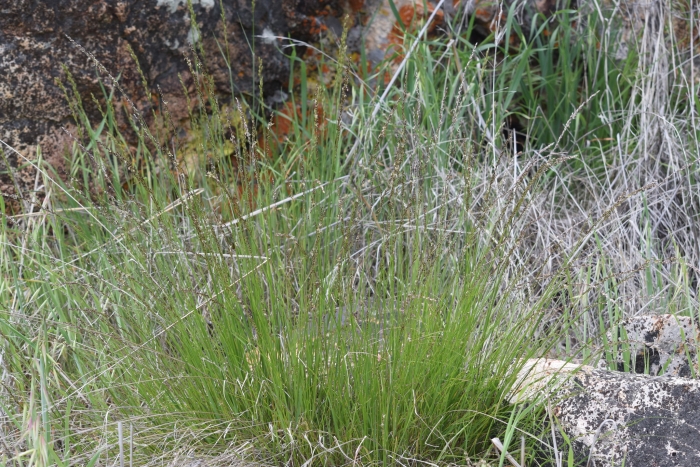Smallflower Melic Grass
(Melica imperfecta)
Smallflower Melic Grass (Melica imperfecta)
/
/

Pinnacles National Park
CC BY 4.0
Image By:
Pinnacles National Park
Recorded By:
Copyright:
CC BY 4.0
Copyright Notice:
Photo by: Pinnacles National Park | License Type: CC BY 4.0 | License URL: http://creativecommons.org/licenses/by/4.0/ | Rights Holder: Pinnacles National Park | Publisher: iNaturalist | Date Created: 2018-05-01T14:03:27-07:00 |




















































Estimated Native Range
Summary
Melica imperfecta, commonly known as Smallflower Melic Grass, is a perennial evergreen grass native to open woodlands, grasslands, chaparral, and oak savannas in California and Northwestern Mexico. This species typically grows up to 1.2 meters (3.9 ft) in height and is characterized as a bunchgrass due to its growth in dense tufts without rhizomes or corms. The inflorescence is a narrow or spreading series of spikelets, which are primarily green with hints of purple, and may not be particularly showy. Smallflower Melic Grass is valued for its adaptability to various soil types and its ability to thrive with minimal water, making it an excellent choice for water-conserving landscapes and habitat gardens.
In cultivation, Smallflower Melic Grass is appreciated for its low water requirements, ease of maintenance, and contribution to biodiversity by providing habitat for native fauna. It is often used in natural landscaping, as a component in native plant gardens, and for erosion control due to its bunching habit. It performs well in full sun to part shade and prefers soils with medium to fast drainage. While it is drought-tolerant, occasional watering during prolonged dry periods can help maintain its appearance. Gardeners should be aware that in some conditions, it may self-seed and spread, which could be considered invasive in certain settings.CC BY-SA 4.0
In cultivation, Smallflower Melic Grass is appreciated for its low water requirements, ease of maintenance, and contribution to biodiversity by providing habitat for native fauna. It is often used in natural landscaping, as a component in native plant gardens, and for erosion control due to its bunching habit. It performs well in full sun to part shade and prefers soils with medium to fast drainage. While it is drought-tolerant, occasional watering during prolonged dry periods can help maintain its appearance. Gardeners should be aware that in some conditions, it may self-seed and spread, which could be considered invasive in certain settings.CC BY-SA 4.0
Plant Description
- Plant Type: Grass
- Height: 3-4 feet
- Width: 2-2 feet
- Growth Rate: Moderate
- Flower Color: N/A
- Flowering Season: Spring, Winter
- Leaf Retention: Evergreen
Growth Requirements
- Sun: Full Sun, Part Shade
- Water: Low
- Drainage: Fast, Medium
Common Uses
Bird Garden, Fire Resistant, Groundcover, Low Maintenance
Natural Habitat
Native to open woodlands, grasslands, chaparral, and oak savannas in California and Northwestern Mexico
Other Names
Common Names: Little California Melic , Small Flowered Melic , Oniongrass
Scientific Names: Melica imperfecta , Melica imperfecta var. flexuosa , Melica imperfecta var. refracta , Melica imperfecta var. minor , Melica imperfecta var. imperfecta , Melica parishii , Melica poaeoides , Melica panicoides , Melica colpodioides , Melica imperfecta var. pubens
GBIF Accepted Name: Melica imperfecta Trin.